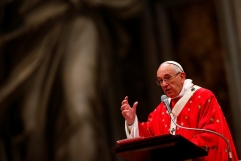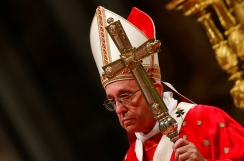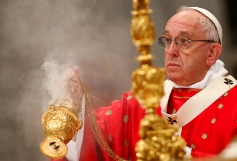The idea of conquest "inherent in the soul of Islam" is also present in Christianity, according to Pope Francis, who warned against colonialism when talking about the Christian root of Europe.
Speaking to the French Catholic newspaper La Croix in a wide-ranging interview about the migration crisis and the role of Christians within it, Pope Francis did not shy away from challenging the church to engage with Islam, celebrating Sadiq Khan's election as London Mayor.
Concerning migration, Francis said it is "fair and responsible" to ask whether Europe has the capacity to accept so many migrants, but that "the deeper question is why there are so many migrants now."
He seemed to reject links between Islamic extremism within Europe and Islam itself, rather focusing on the way Europe has "ghettoised" migrants.
"The worst form of welcome is to 'ghettoize' them. On the contrary, it's necessary to integrate them. In Brussels, the terrorists were Belgians, children of migrants, but they grew up in a ghetto. In London, the new mayor took his oath of office in a cathedral and will undoubtedly meet the Queen. This illustrates the need for Europe to rediscover its capacity to integrate," he said.
Pope Francis made a distinction between ISIS and Islam, claiming that fear has been misplaced onto Islam, when it is better attributed to "ISIS and its war of conquest, which is partly drawn from Islam."
This idea of conquest, he said, was not absent from Christianity:
"It is also possible to interpret the objective in Matthew's Gospel, where Jesus sends his disciples to all nations, in terms of the same idea of conquest."
In this context, Francis suggested the west "question ourselves about the way in an overly Western model of democracy has been exported to countries such as Iraq, where a strong government previously existed. Or in Libya, where a tribal structure exists."
Christianity's contribution to culture should not be through "colonial enterprise", he said, but one "of Christ in the washing of the feet".
Rather than claiming that Europe is "Christian", the Pope urged that we "speak of roots in the plural because there are so many.
"When I hear talk of the Christian roots of Europe, I sometimes dread the tone, which can seem triumphalist or even vengeful," he said.
"Yes, Europe has Christian roots and it is Christianity's responsibility to water those roots. But this must be done in a spirit of service as in the washing of the feet. Christianity's duty to Europe is one of service."
Speaking about the issue of church and state relations, Pope Francis openly supported a strict separation, while suggesting that strong laws are crucial to ensure religious freedom is maintained.
"We are all equal as sons (and daughters) of God and with our personal dignity. However, everyone must have the freedom to externalize his or her own faith," Francis said.
"If a Muslim woman wishes to wear a veil, she must be able to do so. Similarly, if a Catholic wishes to wear a cross. People must be free to profess their faith at the heart of their own culture not merely at its margins."
















